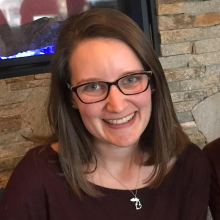April 2021 Spotlight on SRCD U.S. Federal Policy Fellow: Alayna Schreier, Ph.D.
Alayna Schreier is a SRCD Federal Executive Branch Policy Fellow who is placed in the Office of the Assistant Secretary for Planning and Evaluation (ASPE) in the U.S. Department of Health and Human Services
My second year as a SRCD Fellow in the Office of the Assistant Secretary for Planning and Evaluation (ASPE) has provided exciting and challenging opportunities to think broadly about the U.S. Department of Health and Human Services’ (HHS) systems that serve young children and families. At ASPE, I work in the Division of Children and Youth Policy (CYP) within the Office of Human Services Policy (HSP). Our office serves as the Secretary’s principal advisor on policy development by conducting policy research, analysis, and evaluation on issues related to children and youth. Uniquely situated as a policy research office in the Office of the Secretary, ASPE works across a range of HHS programs. This unique positioning has enabled me to take a strategic and wide-angle view of the human services system as a whole and has provided me with multiple opportunities to apply my knowledge, skills, and expertise and engage in systems-building work.
As the federal government transitioned from COVID-19 response to recovery, we have had the chance to reimagine the systems that serve children and families and to move towards positive and equitable health and well-being outcomes. One space in which we are taking actionable steps to improve the early childhood system is alignment and coordination. Systems alignment and coordination has the potential to enhance the collective impact of early childhood programs toward a shared vision of early childhood health and well-being. I have had the opportunity to co-lead a group of HHS colleagues focused on the coordination and alignment of needs assessments, which require early childhood program grantees to gather information from their communities that will inform service provision. In Fall 2020, we conducted preliminary analyses to map the landscape of existing needs assessments and identify recommendations for activities to facilitate alignment and coordination. Through these preliminary efforts, we recognized that there were similar opportunities for alignment and coordination across the outcomes and performance measures used by early childhood programs. This led to collaboration with another group of federal partners to develop a joint proposal focused on coordination, alignment, and equity of both needs assessments and outcomes and performance measures. We were able to maintain the momentum for this proposal across the change in federal administrations and it is exciting to see this work move forward.
The past year has also highlighted other opportunities to enhance the systems serving children and families. There is a heightened recognition of the need to attend to the health and mental health needs of children and families exposed to trauma, as we have seen the multiple adversities faced by families, including the COVID-19 pandemic and its associated economic challenges, natural disasters, social isolation, and racial inequity and injustice. Trauma-informed care is one approach to services that aims to strengthen resilience and improve outcomes for individuals, families, and communities. In 2018, Congress passed the SUPPORT Act, which established the Interagency Task Force on Trauma-Informed Care at SAMHSA. The Task Force was charged with 1) developing a National Strategy to identify and disseminate best practices in the areas of prevention, identification, referral, and intervention for children and families exposed to trauma; and 2) enhancing federal coordination to improve the federal response to families impacted by trauma. I was able to take a leadership role in the development of the National Strategy and its corresponding Operating Plan with colleagues at SAMHSA and bring my background and expertise in this area to inform this effort. It has been truly invigorating to think about and plan for a transformation of the trauma-informed system with an emphasis on resilience, strengths, and equity.
I initially pursued the SRCD Policy Fellowship because I wanted to learn ways to leverage science to inform policy and programs. My time at ASPE has taught me that and more, and I now have a more well-rounded understanding of how research and policy interact with the implementation needs within community contexts. I am grateful to SRCD and ASPE for this incredible learning opportunity and look forward to continuing to apply these skills and understanding to enhance services for young children and families.
